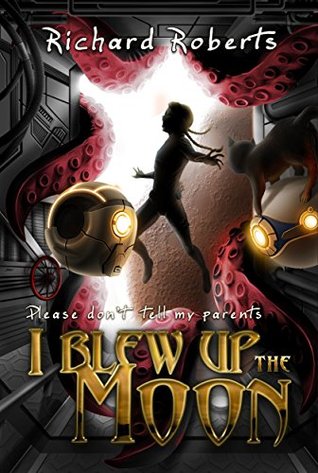So you may remember way, way back over a year ago, I reviewed a book called Please Don't Tell My Parents I'm a Supervillain, a book about teenager Penelope Akk who develops mad scientist superpowers and, somewhat unintentionally, begins an exciting career as a supervillain known as Bad Penny with her friends Claire, aka E-Claire, and Ray, aka Reviled. I remember it being a fun book that I enjoyed but for whatever reason it took me a year to get around to reading the sequel, Please Don't Tell My Parents I Blew Up the Moon, which was such an intriguing title I thought it would be worth investigating.
In this book, Penny and friends are basking in the success of their latest heist from the last book, but can't wait to get back into the field and get some supervillainy going. Especially since Penelope has the outline of another mad science device in her mind but it's going to need some serious biotech hardware. The Inscrutable Machine also gets a message from Spider, the big supervillain overlord of L.A., inviting them to come to her secret base. There, Spider reveals that mysterious transmissions have been detected coming from the vicinity of Jupiter and would the Inscrutable Machine be interested in investigating Jupiter to see what's going on? Penny and friends of course jump at the opportunity to explore space and are soon tangling with all number of nasties in the outer solar system.
One of the things I liked about the previous book was Penny was a pretty interesting character. She builds tons of neat, reality-warping stuff but has little or no idea how she manages to put it all together. Penny also is genuinely a good person and is trying to be good. Most of the time the stuff the Inscrutable Machine does isn't really evil, just illegal. But any time Penny tries to think about becoming a hero instead, something manages to interfere and keep Bad Penny firmly in the supervillain camp. This book did underline the fact Penny can't control her superpower at all and usually blacks out while she's building her gizmos. Penny also gets serious headaches from all the creativity and she's wondering if it might actually be a health hazard. This doesn't get explored terribly much in this book, so I'm wondering if Roberts is saving it for later installments.
The biggest issue I have with this book is I feel like it's trying to do too many things at once, and we're not given enough explanation to understand the stakes. On some level this makes sense because Penny and friends walk in with no information about what exactly is around Jupiter and they're so awed by everything they see they never spend much time stopping to ask questions. This does come back to bite them in the behind later, but let's not spoil that.
As far as I can tell there seem to be roughly four factions in the moons of Jupiter that are struggling for dominance, two alien races from beyond the solar system and two human groups inhabiting space stations. The alien races consist of the Puppeteers and the Conquerors, who are natural enemies. The Puppeteers are a hive-mind, biotech collective that like to assimilate people and make them slaves. The Conquerors are an entirely mechanical race which exterminate all resistance to pave the way for their masters to take over, however their masters died out long ago so the Conquerors simply keep on destroying things. For whatever reason, both of these aliens hate each other and will ignore humans to attack their enemies.
The humans appear to be divided into the Rotors and the Jets. The Rotors live on a space station orbiting Callisto under the control of the automatons, robots who manage the entire lives of their human charges, down to managing the gene pool through selective breeding. The Jets live mostly on the station orbiting Io and are far more individualistic and free, but also are always struggling at the brink of starvation, scrambling for resources, and their leader appears to be little more than a bully. It's also implied that the Rotors and the Jets have significantly different technology systems, which furthers the differences between the two factions who are in constant low-level hostility with each other.
So we have a lot going on at once and I feel like Roberts could have put in just a tad more exposition than he did. I'm actually okay with humans not knowing a lot about either the Puppeteers or the Conquerors. Both were alien races determined to wipe out humanity in one form or another with single-minded obsession so it makes sense humanity never stopped to try to talk to them. But with the Rotors and the Jets it just raises a bunch of questions and I would have liked a little bit of explanation. Why do they hate each other? What do both sides hope to accomplish? How did they colonize Jupiter in the first place? Was there always this division or did it evolve over time? As corny or frustrating as some exposition would have been, I feel like we really needed that to understand what the heck was going on around Jupiter's moons. Throw in two alien races, about whom very little is known, and it gets even more complicated.
I do like Penelope although as I said, I feel like this book was muddled and could have used more exposition. I also get the feeling there are greater things moving which we haven't fully seen yet and we'll only be made aware of in later books. Personally, this one doesn't feel quite as good as the previous book and I think it's because it lacks direction more than anything else.
- Kalpar


No comments:
Post a Comment